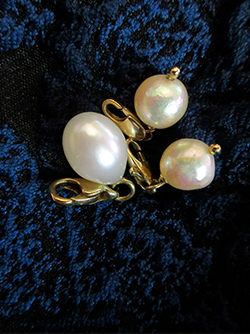...Impossible working alone.

Any manufacturing – a book as a dress – needs a number of competences, different and cooperating but never compulsory : maybe it is in that ‘non compulsory’ habit the ‘core’ of satisfaction, that is an exclusively human item as it does stand on work.
How can then we justify the ingenuity of neurotic repetition and of that ‘fixation’ as we name it, i.e. a pathological obstacle to acknowledge the presence effectiveness of a real person ?
Maybe it would be enough pointing the mythic jouissance ‘no power’ which cannot other be than prisoned by an irrelate ‘non partner’ : while we know that also parents – as a man and a woman – really are since the birth of a child as partners to be tested (and that way it would be convenient they stay and maintain…).
A pathological pain, even for a child, awards any lie on loneliness – even when we say it is our authonomy : up to the most distressing amnesia, acted being threatened to give up to one’s own satisfaction, ‘jouissance’ is just a part of it, as far as it has been just a little experienced by someone.
‘Heimlich’ – from ‘heim’, home – Freud uses to indicate something which ‘pertain to home’[1], and ‘unheimlich’ to indicate its opposite moving mistrust and then anxiety when the ‘non familiarity’ is removed, distanced as matter of fact but without any further elaboration.
Freud spent years to be able to link a liquidation of anxiety, as a solution to pathological consumption of anxiety as effected by melencholy, up to the myth of Prometheus Titan[2] - punished by gods because of his fire theft – and of Heracles[3] who, while saving Prometheus and fire and water – notwithstanding it was already a property of humans - acknowledges the law regulating humanity : the myth however does neglect the reality of sexes which – even in their difference - can change position in a partnership.
Gods then originated a ‘qui pro quo’, or misunderstanding, which rarely is cleared and which can put into each one of us a heroic iper-responsibility[4].
Marina Bilotta Membretti, Cernusco sul Naviglio May 2, 2021
<Picture ref.: 0_5520117_125008.jpg>
[1] ‘Il perturbante’, S.Freud (1919) in “Sigmund Freud. Opere II”, Gruppo Editoriale L’Espresso SpA (2006), pp.761-763
[2] It is infact of 1931 the edition of ‘The acquisition of fire’ by S.Freud : I’m referring here to Giacomo B.Contri translation (2007) for ‘Studium Cartello – Il lavoro psicoanalitico’, e-book.
[3] Aeschilus (525 a.C.-456 a.C.) is the author both for ‘Prometheus chained’ and ‘Prometheus saved’ : we have then just fragments, and references in other authors works.
[4] “God created man at his own image; at image of God him created; male and female them (He) created”/ Genesis 1, 27.